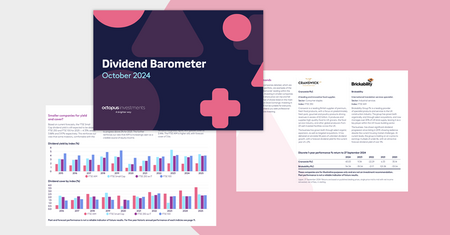As Head of the Octopus Inheritance Tax Service, I’m responsible for the investment strategy of the product. I also manage a small team dedicated to managing Fern Trading Limited (Fern), assessing new growth opportunities and running the day to day central functions of the company.
Fern is the company that most Octopus Inheritance Tax Service investors hold shares in. It outsources the day-to-day management of its business to Octopus.
Across Octopus, we have 150 or so investment professionals who are experts in their chosen sectors, such as Renewables, Property and Healthcare. These individuals are constantly on the lookout for new opportunities that fit with Fern’s strategy, and bring them to the Investment Committee for detailed consideration, which my team runs.
My team is also responsible for managing Fern’s central functions, with people dedicated to such specialisms as cash flow management, valuations, administration of the Investment Committee, and banking relationships.
We take a very cautious approach to the way Fern is run. We know investors in the Octopus Inheritance Tax Service are more concerned about downside risk than seeking high growth, and our management of Fern reflects that.
This can lead to quite unusual Investment Committee meetings for the uninitiated. That’s because instead of focusing on how profitable something could be for Fern in upside scenarios, we focus on how much of Fern’s capital could be at risk, how saleable its assets are expected to be if we ever had to exit them, and risks around qualification for Business Relief (BR).
In other words, we focus on downside situations and how we might mitigate them. Everything we do focuses on three key themes that we look to achieve for investors in Fern; BR qualification, access to their investment if needed, and a steady predictable return. Hopefully this note will help you understand more about which types of client the Octopus Inheritance Tax Service might be suitable for, and why.
Business Properly Relief (BR) qualification
First and foremost, we’re careful to identify sectors that fall squarely within the qualification rules for BR. We seek to avoid activities that may qualify, but where the likelihood is lower. We want to make sure that shares in Fern are expected to qualify for relief today, and for the foreseeable future.
That means that there are some sectors that we intentionally avoid even though they are expected to qualify for relief today. That’s often frustrating for our investment teams who come up with great ideas and opportunities, but we have to turn them down if they don’t meet our gold standard of BR qualification.
We think that this aversion to BR risk is a major reason we have delivered BR to more than 3,600 investors in the Octopus Inheritance Tax Service over the last 12 years without, to the best of our knowledge, any concerns being raised by HMRC.
Access to investment when requested
Fern’s strategy is to acquire assets and operate in sectors that are highly marketable and liquid. This is important because the second key part of our mandate under the Octopus Inheritance Tax Service is to target being able to provide investors with an exit from their investment in a timely fashion when they ask for it. We know that this is often a key reason for an investor making a BR-qualifying investment instead of undertaking another form of more permanent estate planning, such as gifting.
On a day-to-day basis, liquidity is provided through facilitating share sales between investors. But we don’t assume this will always be possible. A key part of my job is to ensure that, in a situation where more investors want their money back than want to make new investments (such as a change in tax rules), Fern’s business is well positioned to be able to buy shares back from investors without a fire-sale.
Fern’s short-term property lending is an example of a part of the business that generates a large level of natural liquidity, as hundreds of loans are redeemed each year. So too are Fern’s commercial-grade renewable energy assets because if we had to, we expect to be able to sell them within 12 months due to their quality and high demand in the sector from institutional investors. We also have a revolving credit facility of up to £160 million that can be used to facilitate share buy backs. For context, that is sufficient to meet 100% of investor withdrawal requests in a typical year.
In this we way, we have put liquidity at the heart of the Octopus Inheritance Tax Service and have grown Fern in a way that supports that objective. Of course, we can’t ever guarantee liquidity, but we’re very conscious of its importance to investors, and we manage Fern accordingly.
On that point, there are other risks of investing in the Service that you should bear in mind.
- The value of an investment, and any income from it, can fall as well as rise. Investors may not get back the full amount they invest.
- Tax treatment depends on individual circumstances and could change in the future.
- Tax relief depends on portfolio companies maintaining their qualifying status.
- The shares of unquoted companies could fall or rise in value more than shares listed on the main market of the London Stock Exchange. They may also be harder to sell.
Predictable long-term growth
Another important part of our mandate is to target predictable, steady growth over the long term for Fern shareholders.
Fern operates a carefully blended business model that combines short-term lending with owning and operating businesses in targeted sectors, typically underpinned by tangible assets or secure revenues streams. Fern only operates in sectors where Octopus has significant in-house expertise and experience, such as property lending, renewable energy and construction in the healthcare and energy sectors.
The lending operations are more naturally liquid, and offer opportunities for faster redeployment of Fern’s capital. This allows us to quickly adjust the risk profile and focus of our lending book, as old loans re pay and new ones are made. We have also built in a large degree of diversification, with more than 250 loans typically in place at any one time. Ninety-nine percent of loans are secured on a first ranking charge basis against property, with Fern lending at a maximum loan-to-value (LTV) of 70%.
The operating businesses that Fern owns tend to be in sectors with predictable revenue streams over a long period of time, such as renewable energy generation sites. These types of businesses complement our lending because they give us visibility over revenue streams over the long term, typically 20-25 years.
Investors benefit from Fern’s scale
From my perspective, the fact that we have grown Fern over the last ten years to be a trading business over £2 billion in size is a great thing, as this scale delivers several benefits to Fern’s shareholders:
- Diversification across sectors
There are ten separate parts of Fern’s business, with their returns driven by different factors. The scale we have reached has enabled us to build this diversification across sectors without compromising the quality of the assets we acquire, as would happen if we could only buy smaller projects or companies which typically have less predictable growth expectations and may be less attractive to future buyers if Fern were to ever sell them.
- Reduced concentration risk
Across Fern’s group, it owns more than 450 underlying assets (over 200 property loans, 150 solar farms, 3 retirement villages and 2 ultra-fast fibre broadband businesses, to name some of these).
Again, this is only possible because we have grown Fern to its current size in a careful and steady manner since it started to trade in 2010.
- Ability to explore new sectors
Scale improves the set of opportunities Fern can explore. We are able to deploy meaningful amounts of capital to into a new sector while still keeping that activity small relative to the overall size of Fern’s business, until it proves to be successful. It gives us access to opportunities we simply wouldn’t have with a smaller balance sheet.
- Tested by HMRC over ten years
Thousands of Fern shareholders around the country have passed away over the last ten years. That means HMRC has seen thousands of claims for BR from their estates. We’re yet to hear of a single example of a claim being rejected.
- We attract the best talent and the best deals
Our size is a key reason we’re able to employ high quality, experienced investment managers. It’s also why we’re approached on a regular basis to consider acquiring commercial grade assets in the sectors where we specialise.
Where to find out more
If you have a client you think may benefit from the Octopus Inheritance Tax Service, you can find more information about it here.






